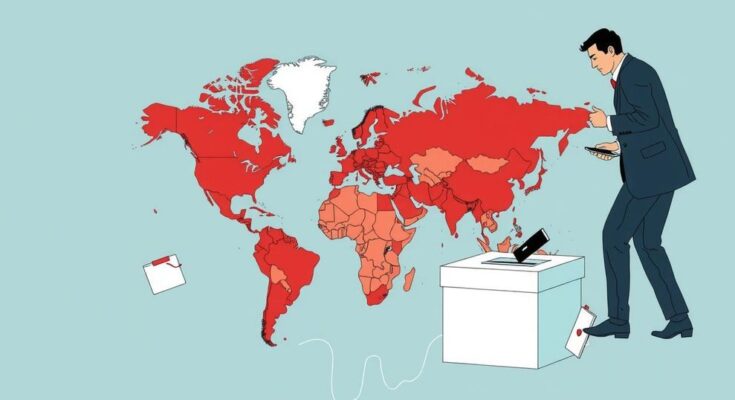In 2024, global elections reflected a sharp decline in support for incumbent governments amid widespread voter unrest and economic instability, resulting in a notable rise of populist and far-right parties. Key electoral events included significant losses for traditional parties, civil unrest, and allegations of electoral interference, raising questions about the integrity of democratic processes. Despite strong theoretical support for democracy, public satisfaction with its execution remains critically low.
The 2024 global elections presented a tumultuous tableau marked by widespread voter dissatisfaction with incumbent governments. A significant portion of the electorate across approximately 70 countries, which constitutes half the world’s population, emphatically expressed their discontent by ousting incumbents amid economic turmoil and heightened global tensions. The political landscape was characterized by the rise of populist and far-right parties, as well as numerous instances of civil unrest and electoral disruptions in various nations.
Political analysts suggested this widespread anti-incumbent sentiment reflected deeper socio-economic grievances referred to as “electoral long COVID,” wherein the residual impacts of the pandemic exacerbated public unhappiness regarding policies on employment, education, and health. Notable electoral results included the weakening of traditional powers in countries such as South Africa, where the African National Congress faced significant declines, leading to its coalition with opposition parties. Moreover, Prime Minister Modi’s government in India suffered a surprising electoral defeat, forcing a shift to coalition governance.
In Europe, developments illustrated a notable shift towards right-wing politics, with parties such as France’s National Rally gaining traction, although they ultimately faced challenges from coalition movements on the left. The political environment in countries experiencing alleged external interference, particularly from Russia, raised significant concerns regarding the integrity of democratic processes.
As democracy faced turbulence, a concerning trend emerged: while theoretical support for democratic governance remains robust, the reality often fails to meet the populace’s expectations, leading to a growing sense of disenchantment among voters. This year of global electoral upheaval signals a continuation of challenges ahead as nations grapple with electoral integrity and governance issues moving into 2025.
The 2024 election year has been pivotal, involving elections in numerous countries, leading to significant shifts in political power and widespread voter dissatisfaction with established political systems. Key factors influencing this tumult have included the economic impacts of the COVID-19 pandemic, inflation linked to global conflicts, and deep-seated grievances over governance styles. Numerous elections nationwide illustrated a rejection of incumbent politicians or traditional parties amidst rising populist sentiments and civil protests, marking a year characterized by democratic turbulence.
In summation, the elections of 2024 have underscored a profound discontent with incumbents globally, driven by economic hardships and ineffective governance. As voters increasingly lean towards alternative parties and express dissatisfaction with their democratic institutions, the political landscape anticipates continued volatility. As noted by experts, the strength of commitment to democracy contrasts starkly with the tangible satisfaction voters derive from their current political systems, suggesting an imperative for re-evaluation of governance worldwide.
Original Source: www.clickondetroit.com




